Wstęp. Co dziś komu po rodzinie? (Barbara Wolska, Marek Pąkciński)
XIX numer rocznika „Napis” (2013), zatytułowany Album rodzinny z traumą w tle poświęcony jest relacji między sferą osobistą ludzkich doświadczeń, koncentrującą się wokół rodziny, a dziedziną szeroko rozumianych przeżyć wspólnotowych, z którą zwykło się kojarzyć historię i historyczność polską i wielokulturową. Byłoby to zatem doświadczenie historyczne (przede wszystkim niosące traumę, np. XIX-wieczne powstania: listopadowe i styczniowe, I i II wojna światowa lub Holocaust) wyrażane przez pryzmat specyficznych tekstów i świadectw związanych z rodziną oraz charakterystycznych dla niej, szczególnych relacji emocjonalnych: pamiętników, listów, dzienników, a także literackich narracji o rodzinie i sposobie przeżywania przez nią doświadczeń kryzysowych (w sensie historycznym) bądź wspólnej, narodowej lub społecznej traumy (rozbiory, klęski powstań narodowych, okupacja itp.).
Prezentowany numer pisma jest przedsięwzięciem ponadepokowym i interdyscyplinarnym, ponieważ biorą w nim udział badacze parający się różnymi zagadnieniami z zakresu historii i teorii literatury oraz reprezentujący inne dyscypliny: historycy, historycy kultury, fotograficy (wśród nich studenci Akademii Sztuk Pięknych). Ci ostatni wzięli udział w konkursie pt. Album rodzinny z traumą w tle, zorganizowanym we współpracy z Redakcją „Napisu” przez Pracownię Fotografii oraz Pracownię Projektowania Intermedialnego warszawskiej Akademii Sztuk Pięknych.
Poza główną częścią tematyczną (Rozprawy i materiały) poprzedzoną wstępem pt. Co dziś komu po rodzinie?, kolorową wkładką, prezentującą prace studentów ASP (Varia) rocznik zawiera również dział Pasje i potyczki edytorskie i tekstologiczne oraz Recenzje.
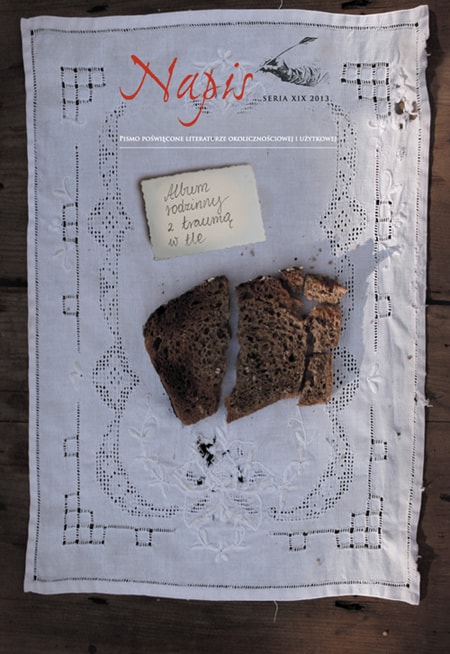
Wstęp. Co dziś komu po rodzinie? (Barbara Wolska, Marek Pąkciński)
Teresa BANAŚ-KORNIAK
Zgodnie z zasadą decorum. Przyczynek do wyjaśnienia wątków metapoetyckich w „Trenach” Jana Kochanowskiego
Artykuł (PDF) Show abstract Hide abstract
The essay is an analysis of the so-called „framework” elements in Kochanowski’s Laments (including the title, dedication, Epitaph for Hanna Kochanowska), and metapoetic fragments of the mourning cycle, particularly where the poet refers to the contemporary judgements about the status of poetry and the poet. The author concludes that the author of Laments in the late stage of his work not only greatly modified his views on theoretical issues in the art of poetry (because he even contradicts in Laments some of his opinions expressed in the previously written poetic manifesto – The Muse), but also offered his contemporaries and posterity, more subjective interpretation of the principle of appropriateness (decorum), held in a spirit of modernity and in search for new poetic solutions.
Iwona MACIEJEWSKA
Matrony i kawalerowie służący Ojczyźnie – portrety członków Radziwiłłowskiej familii z przemilczeniem w tle
Artykuł (PDF) Show abstract Hide abstract
The article is an analysis of diary of Michał Kazimierz Radziwiłł – known as „Rybeńko” (1702-1762) – in terms of reading the way of presenting the relations within family there. Reading his very extensive writings, carried regularly for several years, proves the strategy adopted by the author regarding the presentation of the events in relation to the members of the magnate family. It is suggested to ignore inconvenient facts, as well as to conceal controversial motives or consequences of their own actions, and also further or closer relatives. Whereas everything that canbring glamour and recognition is emphasised. Radziwiłł tries to create an idealized image of the family, looking on their relatives from the perspective of social roles, in which they shall be filled. The aim of the article is to discover and describe the mechanisms, present in the diary, as concealment and conscious creation, contributing to a spotless family portrait construction.
Jacek GŁAŻEWSKI
Pani Roland i trauma Rewolucji
Artykuł (PDF) Show abstract Hide abstract
The article is devoted to diaries (Mémoires particuliers and Mes dernieres pensees) written by Marie-Jeanne Roland de La Platiere, also known as Manon Roland, or Madame Roland (1754-1793), a French political activist. It is one of the most interesting document of personal life that emerged during the French Revolution, and the it refers extensively to the events before 1789. In this context, the memoirs seem to be not only the result of implementation of the „autobiographical pact”, but also a struggle for one’s own subjectivity: to prove the world that the essence of human personality does not develop in the fever of current political events, because it lies far beyond current experience. The story is told in the „past perfect” tense to release the author from the oppressive domination of the present over the whole life experience, and to create a chance to equalize the ratio between a brutal critique of revolutionary public opinion, which she was subjected to, and the will of a personal, individual memory. A careful reading of Memoirs allows to grasp the author’s struggle with the “spirit of history” and an unconscious encroachment of the revolutionary discourse to the area of personal memory, causing a kind of rupture or implosion of the genre form, revealing the force of revolutionary trauma. Madame Roland, who described her purely political experience in letters and other writings in prison, tried to turn off her Mémoires particuliers from the power of the revolutionary discourse. However, the impact of the freshest memories embedded in the memory questioned these operations. It was impossible to find a perfect way to mask the trauma: the very speech undermined the effectiveness of silence here. What has already been told (according to the logic of the narrative), called for complementation.
Elżbieta DĄBROWICZ
Ojciec ze skazą… w literaturze i kulturze XIX wieku (przypadek Zygmunta Krasińskiego)
Artykuł (PDF) Show abstract Hide abstract
In a letter from February 1864 Cyprian Norwid observes that among Polish patriots, working actively in recent years, prevail the sons of traitors, more precisely speaking: people accused of treason. This observation is the author’s starting point for reflections that go in two directions. On the one hand, it resembles the phenomenon of „treason mania”, defined as a pathological symptom of public life in the era of post-partition, but also indicating the non-institutional tribunal functioning – the court of opinion; on the other – it analyses filial problems with their fathers, whom the public opinion considered as traitors. A particular one among such sons is Zygmunt Krasiński. The author reflects on the far-reaching consequences of the events at the University of Warsaw, when colleagues of the young Krasiński ruled him out of themselves, and de facto out of the national community, because he did not participate in a patriotic demonstration on the occasion of the funeral of senator Piotr Bieliński. One such consequence was the status of infamis, which, as it seems, Krasiński adopted, functioning later as a poet-anonymous.
Aleksandra BUDREWICZ
Retoryka codziennej traumy („Dombey i syn” Charlesa Dickensa)
Artykuł (PDF) Show abstract Hide abstract
The rhythm of Victorian family life, described by Dickens, was subordinated to a sense of unfulfilled expectations. Parents and children lives take place in the shadow of death. Each subsequent chapter builds the atmosphere of a fearful waiting for disaster. Death of his wife, and later the death of Dombey’s company successor, is a trauma, with which other family members cope in different ways. Dombey, until he can, plays the role of a heartless statue, and his selfishness hurts a lot of people, including the only character who loved him, i.e. his daughter. Florence is subjected to various tests of fate, until she finally accepts the orphanage and creates a new family system, based on a deep and unconditional love of all its members. Dickens argues that trauma is a painful experience that may soften love. The article draws attention to two of this type of experience in the writer’s life that shaped his sensitivity to the social harm of children.
The interpretations of Dickens in English highlighted the social role of the theatre of everyday life. They interpreted unilaterally the behaviour of characters as a form of protest against the values of bourgeois life, while spared the psychological issues and the question of love as an optimistic message of the novel. This work is intended to indicate a different direction of analysing the novel. Recalling the findings and theoretical works on trauma (its understanding, describing and research) by Cathy Caruth, Shoshana Felman, and Maja Lis-Turlejska, a dramatic and difficult relationship of the father and daughter in Dickens’ Dombey and son was analysed. Application of the concepts of trauma, and the post-traumatic stress disorder, and so called basic hope will allow to recognise Dombey and Florence as a deeply unhappy, and hurt characters, who are consequently unable to communicate properly their needs and desires.
Agnieszka BĄBEL
Rodzinne oswajanie traumy. Anegdota, humor, bagatelizowanie jako strategie opowiadania o walce i zesłaniu we wspomnieniach o powstaniu 1863 r.
Artykuł (PDF) Show abstract Hide abstract
The article is a part of current „anniversary” discussion dedicated to the January Uprising and its consequences, however, it is attempted to discover its less typical image, often contrary to the established, not to say stereotypical vision of the national uprising and martyrdom. In the narratives often created for the members of its own family, written in private literature (of personal document), the relation of the events associated with the rebellion often appear surprising due to their sense of humour, and colourful anecdote, showing the reactions and experiences of the insurgents (like in the memoirs of Kazimierz Zienkiewicz), and self-irony, the ability to perceive the grotesque and the pragmatism of the Siberians (as in the memoirs of Jadwiga Prendowska, Władysław Zapałowski’s diary, Leon Krupecki’s letters).
The aim of the text is primarily to show various ways of „disarming” the tragic experience by emphasizing their exoticism and comedy, or focusing on tiny problems of everyday life, which probably – as for individuals and families – constituted psychologically effective strategy of defence.
Tadeusz BUDREWICZ
Pokuta bez rozgrzeszenia. Samobójstwo i jego skutki w powieści drugiej połowy XIX wieku
Artykuł (PDF) Show abstract Hide abstract
The text is based on detailed interpretation of the source novels: Kobiety i mężczyźni by Józef Wojciechowski, Syn znajdy by Piotr Jaksa-Bykowski, Pasierbowie fortuny by Natalia Korwin-Szymanowska, Plotka by Marian Gawalewicz, Matka by Emma Jeleńska, Zamieć w stepie by Michał Grabowski. In addition, some novels and short stories by such authors as Adolf Dygasiński, Tadeusz Jaroszyński, Eliza Orzeszkowa, Maria Konopnicka, Ignacy Maciejowski (Sewer), Michał Bałucki were selected as a background for comparison.
The article proves the following thesis: suicide in the family, or among close friends, becomes a border that makes a new stage of life difficult to bear psychologically and socially; psychologically because people cannot stand the fact that someone close to them violated the taboo, so either they go mad, or they are silenced (suffering and silence are the only one life style strategies within observed material); socially because living after the suicidal death of a member of a small community are stigmatized, partially excluded from the community, they live on the margins of social communities, become specimens/ exemplars to teach socio-moral values, and serve to strengthen the religious and social group cohesion.
The trauma of the survivors after the suicide of a family member leads to the adoption of rationalising attitude consent to the judgement of fate, which one does not try to understand, or to an attitude of humility before the social community power whose rights have been ignored. Attempts to surround with love and worship the suicide are signs of the crisis of the socio-moral system based on Christian ethics (J. Wojciechowski, M. Gawalewicz, E. Jeleńska). Statistically speaking, in the novel from the 2nd half of the nineteenth century the motif of the suicidal death is still maintained as a final of the action, however, there appear some works where the suicide provides functionally a plot twist. Those works, associated with the “nervous age”, were previously seen only in the psychological and decadent perspective. The suicidal trauma forces us to recognise in them the signs of the crisis of traditional ethics.
Marcin DZIKOWSKI
Bilans uczestnictwa. Rodzina w powieściach Stanisława Brzozowskiego
Artykuł (PDF) Show abstract Hide abstract
The article reflects on the stories of families present in the novels of Stanisław Brzozowski: Pod ciężarem Boga, Wiry, Płomienie, Sam wśród ludzi, and Książka o starej kobiecie. In all these texts, family threads are interwoven with the presence of trauma. It has a dual dimension: private and public, which, however, in the works of Brzozowski are strongly interconnected. These novels are treated as a series of components of the „grand narrative” enclosed in them and through them, regarding the Polish family in the nineteenth and early twentieth century. The ranking of Brzozowski’s novels is consistent with the order of their creation, so treating them as a part of the single narrative range allow to observe changes taking place in the writer’s reflection on the „family” issue. Each of these texts is formulated in the way that its main characters, criticising mechanisms of shaping interpersonal relationships, strive toward the self-awareness, and through it – to a conscious participation in culture, achieved by a responsible, though difficult, taking part in their own familiar privacy.
Beata UTKOWSKA
Literackie i rodzinne tajemnice z Wielką Wojną w tle. O „Walce z szatanem” Stefana Żeromskiego
Artykuł (PDF) Show abstract Hide abstract
This article attempts to explain the mysteries of „the weakest novel” of Żeromski. It is argued on the basis of the writer’s correspondence and textual analysis of the Walka z Szatanem that both the genesis of this work, its stylistic and story inconsistencies are motivated by a particular personal situation, in which the writer was at the beginning of the 1913. It seems that this quite unexpected decision – in the context of earlier writing plans – on a new contemporary novel undertaking the subject of major social movements on the eve of the World War I, and requiring studies in the libraries of Western Europe, was a pretext to justify Żeromski’s trip to Italy for Anna Zawadzka who was expecting a birth of their child. Unfavourable for quiet work working conditions (his son Adaś at risk of tuberculosis and his wife, Oktawia, stayed in Zakopane, both unaware of Żeromski’s relationship with Anna for a long time) are reflected in the structure of the text, which in a surprisingly high degree co-match with the prescribed or paraphrased by Żeromski excerpts of books, brochures, and notes of other authors. The article aims to trace the intertwined, difficult, and complicated fate of the writer, his work and history.
Anna Małgorzata PYCKA
„Aby ta ofiara nie poszła na marne” – Stanisława Witkiewicza przesłanie do syna
Artykuł (PDF) Show abstract Hide abstract
In 1863 Stanisław Witkiewicz-father was 12 years old. On the hill behind his home-town Szawle the insurgents were hung. Following from far away those who were leaded to death, he was whispering: “this sacrifice will not be in vain!”. Two years before his death, in 1913, he gave his son a miraculously survived photograph of his uncle, Jan Witkiewicz, called “the only true Wallenrod”. He added there a message: “Think about him and about the life that went beyond the petty miseries of existence”. But the son, unwilling to admire the figures from the pantheon, named the legendary Batyr as a “troublemaker from Afghanistan”, whose fate is “an interesting story for a Pole”.
A detailed analysis of the letters addressed by Stanisław Witkiewicz to Witkacy enables to recognize the sphere of personal tensions, having its source in the family traumas.
Piotr REPUTAKOWSKI
Trauma wojenna jako inspiracja powieści Aleksandra Kamińskiego
Artykuł (PDF) Show abstract Hide abstract
The author of this article interprets the Kamienie na szaniec [Stones for the Rampart] by Aleksander Kamiński, using the methodology of new historicism and psychotraumatology. In particular, the attempt is put into answering the question whether the narrative of Stones… is the story of historiographical, ideological, and mythologising, or rather therapeutic and pedagogical aim. The analysis will also address other selected texts (like Zośka and Parasol [Umbrella]), containing reports of experiencing traumatic events and overcoming the trauma caused by the September defeat and the Warsaw Uprising.
Marek PĄKCIŃSKI
Nowoczesność: opowieść o rodzinie bezimiennej
Artykuł (PDF) Show abstract Hide abstract
In this article, a specific phenomenon of “family story” is being considered on the background of the achievements of modern cognitive anthropology (Dan Sperber, Alvin Ira Goldman), as well as political theory (or political theology) by Aryeh Botwinick, Kenneth Reinhard, and Slavoj Žižek. Referred theoretical considerations serve here as arguments in favour of the thesis that modernity victimizes family and its proper discourse, based on a widely understood concept of kinship, not so much because of the supposedly objective, sociological processes, but within the ideology of the period (authoritarian, totalitarian, or liberal-individualist).
The thesis placed in the text about an oppressive relation of modernity and postmodernity toward “family story” was initially explicated on the basis of Franz Kafka’s works in the interpretation of Michael Wood and, preeminently, in the context of Holocaust testimonies (Imre Kertész, Primo Levi, Calek Perechodnik), serving as a source of “dark light”, shining on the totalitarian elements of modernity.
Anna SPÓLNA
Wskrzeszanie brata. Tadeusza Różewicza historie rodzinne
Artykuł (PDF) Show abstract Hide abstract
The book Nasz Starszy Brat (1992), prepared by Tadeusz Różewicz, is a memorial book based on the type of silva rerum, and dedicated to his brother Janusz, an army soldier and poet murdered by the Nazis. By selecting and confronting with each other various, „recycled” materials (poems, prose, photographs, documents, letters, and memoirs), Różewicz shapes the narrative of a collective and private trauma. He creates a family portrait and self-portrait of the „survivor”, extended between melancholy and mourning in the process of „resurrecting” memory of his brother.
The role of a host of the collection means „the organization of knowledge” (Ankersmit): creating a vision of home by skipping too personal fragments, stylistic interventions, compositional operations. They become tools of control over textually creative mechanisms: „commemoration” and „testimony”.
Różewicz documents the process of silencing the drama as a paradoxical Foucault’s „discursive practices”, and collective response to crisis, which in the light of the psychiatric findings reinforces the guilt of survivors (Orwid). Most important, though only suggested in the way of biographical analogy, is the source of trauma turns out to be the Jewish origin of Różewicz brothers, covered by the silence, which is documented in the later texts of the author of Faces of anxiety: volume of Mother departs (1999 in Polish, 2013 in English), the short story Drewniany karabin (2002). The death of Janusz for Tadeusz Różewicz becomes the ultimate experience of being forsaken by the God. The only form of immortality offered to the Elder Brother results in its resurrection in the word.
Kamila BUDROWSKA
Portret rodziny we wczesnych wierszach (publikowanych i niepublikowanych) Mieczysławy Buczkówny
Artykuł (PDF) Show abstract Hide abstract
The article presents the early poems by Mieczysława Buczkówna, published in literary magazines in 1945-1955, in a collection Rozstania (1949) and Chleb i obłok (1955), and those not accepted by cenzorship for publication. They are characterized by a great thematic and stylistic spread, which can be explained precisely by the influence of controlling activities. The analysis of the archival materials of the main cenzorship council (Polish abreviation: GUKPPiW) provides the conclusion that many poet’s choices were dictated by non-artistic reasons: on the one hand some poems involved in the new political and social order were artificially „glued” to the collections, on the other – the most typical subjects for Buczkówna regarding her family and war trauma were displaced.
The text has a dichotomous structure: in the first part the author describes changes in particular poems and collections; in the second – the family themes marginalised by the clerks from the GUKPPiW are brought out, including both the images of a happy, satisfied family (in love for a man and a child), and pathological one (poverty, drunkenness, disease, death). The author analysed stopped by the cenzorship and a never published poem, although claryfying – W kolejce (written in 1955).
Dawid Maria OSIŃSKI
Albumy utraconej rodzinności – o doświadczeniu środkowoeuropejskości w prozie Sándora Máraiego. Kilka przybliżeń
Artykuł (PDF) Show abstract Hide abstract
The article focuses on the reflection of the Hungarian writer, Sándor Márai (1900-1989), about the family and Europeanism as identity traits. His novels, prose miniatures, essays, travel reports, and a diary, are analysed. The aim is an attempt to describe the experience of the Central-Eastern Europe in prose and intimate writing of the author of Embers, as well as to diagnose the specific nature of private (family) and European identity of the character in such geopolitical map.
For Márai Central Europe is a multicultural project of shattered identity, written project of space, far from the status of a federation of states. In his fictional worlds the writer – as if in the layer of language and plot – constructs Hungary, the former glory of the monarchy and the identity of Central Europe.
The categories differentiating return to the sources, the collection of „lastness” (i.e. past experiences, meetings, reports, events) and melancholy as textual presence of a „lack” of language and search for space, which can be invoked as its own (a kind of „uterine myth”), form the writer’s reflection on the trauma: „nothing that hurts”. Márai’s melancholia is both an existential experience, as well as the writing process – narrative and linguistic. These experiences contribute, through the prose and intimate works of Márai, as an album of „impossibility”, showing a record of trauma of the Central-Eastern European experience, and displaying the impossibility of participation in family and culture.
Paweł KUCIŃSKI
Getto jako narracja antysemicka
Artykuł (PDF) Show abstract Hide abstract
In the text the author attempts to describe the language identity of ghetto in the anti-Semitic discourse, in which the demands of “ghettoization” of the Jews returned in the 30’s of the twentieth century, also in Poland. Before the rise of the shameful wall, before the “Nazi Jewish Quarter” will be the vestibule of hell, the ghetto turns out to be a language construct in a radical right wing of journalism, built by stunts available not only in journalism, but in the language of fiction able to create worlds, in this case – of totalitarian future. It is almost a phantasm, “the place of the intention”, while the language, which “describes” / “imagines” the anti-Semitism by the anti-Semites themselves, is benefited by “creating not directly”, by a future designation (as it results in the plan of the Nazi ghetto settlement).
The ghetto as a phantasm, synecdoche, metaphor, symbol; Jews as dehumanized by language space creatures – create a “comfortable” for the anti-Semites and anti-Semitic discourse concept, in which the Jew, as an identity, as I, is less and less concrete, deprived of individualism with time – with plots – starting to mean pure Evil. The place, however, in which are the Jews settled by the totalitarian imagination is (despite the ambiguity of its defining strategies available in the anti-Semitic journalism), paradoxically, more and more specific, although the language generating discursive ambiguity – in line with the inhuman plan of totalitarian history, will begin in a moment to be implemented in the occupied Europe.
Arkadiusz MORAWIEC
Deportacja z raju. O recepcji „Skrytek” Zofii Romanowiczowej
Artykuł (PDF) Show abstract Hide abstract
The article is devoted to a reception of the novel Skrytki, recognised as the most outstanding work of Zofia Romanowiczowa, a writer constantly undertaking in her writing the theme of trauma, especially after the totalitarian camps. This work, complicated on the surface of both style and composition, as well as the ideological speech, is primarily a psychological novel, giving a precise and convincing analysis of the spouses feelings immersed in suffering, the source of which is incurable illness of their son. The fate of this emigrant family, settled in France, is marked by – which is subtly indicated in the stylistic operations (including camp imagery) – the specific experiences for the residents of Central and Eastern Europe, particularly from Poland, and especially by the atrocities of the World War II.
The main problem of the novel, emphasised on the highest and the most general (parabolic) level of meanings, including by analogy, symbolism, topic, intertextual references, is suffering existing in the world and attempts to overcome it, both in terms of its psychological, historiosophic, and theological dimension.
The last of these perspectives, which is associated with the problem of evil, is updated by the writer by positioning (family) tragedy of heroes, and tragic experiences of the twentieth century in the context of the biblical theme of falling and (generating trauma) expulsion from Paradise, Judeo-Christian tradition, and its heterodox borderlands („heretical questions”).
Irina ADELGEJM
„Tak oto urodziłem się w Gdańsku…” („Odzyskanie” Ziem Odzyskanych w młodej polskiej prozie lat 90. XX wieku)
Artykuł (PDF) Show abstract Hide abstract
On the border of the 80’s and 90’s of the twentieth century a criterion of Polish as the main way of self-identification lost its definiteness and self-sufficiency, and therefore the character-narrator-author of a significant portion of young prose works of this period sought support for his own “I” in finding “a little homeland” and in the artistic arranging of his personal genealogy. Memory has become a basis for self-identification, and a nostalgic family myth intertwined in one: the history of the relatives and the genius loci, illuminating the history of the nation only through them.
The nostalgic map of Polish literature has been enriched in the 90s by new Western territories (works by P. Huelle, S. Chwin, A.D. Liskowacki, J. Limon, A. Jurewicz, etc.). It was made by the children and grandchildren of displaced, whose children’s imagination was fed, on the one hand by the stories of parents and grandparents about the resettlement, on the other – by the half-erased traces of German life.
The protagonists of the prose which is often written from the perspective of the post-memory (memoirs of strange trauma, flowing not so much from the experience but from empathy), undertake a kind of archeology of the Recovered Territories, whose memory is similar to the multi-layered palimpsest, bringing out hidden traces of the war and pre-war future of both their own and foreign ancestors. The natural carriers of knowledge of the past are objects, creating “a pocket”, “portable” homeland of their parents and grandparents, as well as things that store the echo of someone else’s experience, a strange fate. The chosen model of autobiographical narrative – stretched between the consciousness of a former child and adult today – enables reading this space-palimpsest without bias, and overcomes the ambivalent sense of randomness/ purposefullness of their own fate, as a result of the family history determined by the chaos of History, offering the possibility to guess the meaning of one’s own existence.
Accordingly, the novels and short stories of the late twentieth century regarding the Recovered Territories focus on the issue of memory, and the guiding principle of the narrative is an attempt to achieve, with the assistance of it – a unity of biography, both on the level of family, and space.
Kamila TUSZYŃSKA
„Dojrzałam do niekomunistycznych butów”. Mityzacja dzieciństwa jako sposób radzenia sobie z traumą
Artykuł (PDF) Show abstract Hide abstract
The comic book Marzi by Marzena Sowa (script) and Sylvain Savoi (drawings) – is an autobiographical comic book series, published recently in France, concerning a childhood of the author in the eighties of the XX th century in Stalowa Wola in Poland.
Apart from the hard conditions of living in the decaying communist system, the image of the relations of Marzi with her parents looks not very lightly. After reading all parts of the comic book series, the addressee is confronted with the confidence, that the childhood of this girl – although represented in warm colors (both in the word and image layers) was not so nice and happy. It was in that time when Marzi was confronted with the death of her beloved grandma, a guinea pig Perełka (Daisy), a cruelty against mentally ill relatives (aunt Henia), sexual prejudices (the figure of Arthur), exclusion of the poor, as well as with the jealousy towards richer relatives, living in France (aunt Irene) and a physical violence or psychical abuse. All that phenomena appear only with the revealing of the story and it turns out, that the mithization of the childhood of Marzi is not so much a try to deal with the trauma of the “great” history (Communist Poland), but with the trauma of “small”, local history – the history of the family.
Bartłomiej SZLESZYŃSKI
Jak przeżyć traumę apokalipsy i odzyskać wiarę w ludzi (w grze The Last of Us)
Artykuł (PDF) Show abstract Hide abstract
The article analyses the title text of culture, created by Naughty Dog studio. The most important topic is a personal trauma experienced by the main character, and caused by the loss of his daughter. This issue is directly related to the moral collapse that after a catastrophe affected the whole humanity.
The key reference and literary inspiration for the work discussed is provided by The road of Cormac McCarthy, and especially by the most significant for this novel topic of morality in times after the disaster, and preservation of humanity in a post-apocalyptic world.
In the presented interpretation also The Last of Us tells the story of redemption the sins of the “time of postapocalypse” by the hero and regaining faith in another human. The road of the main characters, as for a father and son from the American book, is principally directed toward a moral transformation: to understand that one should return to morality before the catastrophe, and establish relationships with other people based on cooperation, not brutal rivalry. The most important reason for the transformation of the main character is a relationship with a fourteen-yeargirl, developing while wandering, which a final moment is to establish between them a father-daughter relationship, whereby the man can be liberated from the original trauma.
An important issue raised in the text is to reflect on different levels of a player’s extremely intense experience of the story being told, stemming from the overall specificity of the medium and a breakthrough construction of The Last of Us.
Janusz TAZBIR
Źle się dzieje w państwie… polskim
Artykuł (PDF) Show abstract Hide abstract
In his article, the author considers complaining as the typical feature of Polish cultural life. He compares the recent situation in Polish culture (i.e. complains about displacement of the classic, paper books by the e-books, Internet and other “new media”) with historical data, concerning i.e. the fear of the displacement of the manuscript by spreading all around invention of printing. According to the author, this fears were false because the manuscript played important role in Polish “underground” of the cultural and political life even in the tweentieth century. Then he refers to the current scientific publications, stating that (despite all recent fears) monographs, dissertations and other humane papers are progressively more and more vast. Unfortunately this vast size does not mix with the accurateness of the data which they contain and with the editorial strictness of these publications. For instance, formal requirements of the publication of the thesis before achieving scientific degree precludes candidates from incorporating critical remarks of the fellow scientists in the final publication. This yields a large number of editorial mistakes and inconsistencies in humane publications. The author prefers coherent, substantive publications, which are free from any factual or editorial mistakes – and that`s his advice for Polish humanists.
Corinne Fournier KISS
Traktaty pedagogiczne Honoraty z Wiśniowskich Zapovej i Klementyny z Tańskich Hoffmanowej – inspiracja czy przeróbka?
Artykuł (PDF) Show abstract Hide abstract
As is well known, the long-lasting influence in Poland of Hoffmanowa’s conservative pedagogical treatise Keepsake of a Good Mother (1819) was criticized by more progressive Polish women writers of the 19th century, such as Narcyza Żmichowska and Eliza Orzeszkowa. But the unexpected success of that book in other Slav countries later in the 19th century, especially in Bohemia, is less well known.
Honorata Zapová born Wiśniowska (1825-1856), a member of the Galician Polish szlachta who moved to Prague after her marriage in 1841 to the Czech writer Karel Vladislav Zap, has been recently exhumed as a Czech writer by Czech and Polish literary criticism: apart from her essays in Czech journals on her native country, much emphasis has been laid on the value of her most important work, Nezabudky, dar našim pannám ([Forget-me-not: A Gift to Our Young Ladies], published in 1859), which was the first book of pedagogy dedicated to the instruction of young women in Bohemia. In her preface to this book, Zapová mentions Hoffmanowa as being one of her many sources of inspiration. Wishing to know more about what exactly Zapová owes to Hoffmanowa, in this article I compare Hoffmanowa’s book of pedagogy with Zapová’s. I am astonished to discover that Zapová’s book is in fact an almost literal translation from Polish to Czech of Keepsake of a Good Mother – in other words, that it is a plagiarism of Hoffmanowa’s book. The main question I ask here is: why did no one until now, either in 19th-century criticism or in our contemporary criticism, mention this literary fraud before?
Album rodzinny z traumą w tle – prace studentów ASP w Warszawie
Komentarze autorów do fotografii
Agnieszka Maria KOBRZYCKA, Na tropie głupoty. Charakterystyka zjawiska w literaturze polskiego oświecenia, Warszawa 2013 (Danuta Kowalewska, Stultorum plena sunt omnia. Głupców pełno wszędzie?)
Pamiętniki króla Stanisława Augusta. Antologia, wybór tekstu Dominique Triaire, tłum. Wawrzyniec Brzozowski, wstęp Anna Grześkowiak-Krwawicz, red. M. Dębowski, Warszawa 2013 (Agata Roćko, Powtórne świata polskiego tworzenie” przez Stanisława Augusta w świetle jego odtajnionych pamiętników)
Franciszek Dionizy Kniaźnin, Po większej części przed światem nie zgasnę. Przekłady z Horacego, zebrał i opracował Jacek Wójcicki, „Biblioteka Aretuzy”, t. 5, Kraków 2011 (Barbara Wolska, Horacy okolicznościowy i użytkowy)
Agnieszka Smolińska, Dyskurs oświeceniowy. Filozofia ks. Antoniego Jakuba Wiśniewskiego SchP (1718-1774), Kraków 2012 (Wojciech Kaliszewski, Między scholastyką i Oświeceniem)

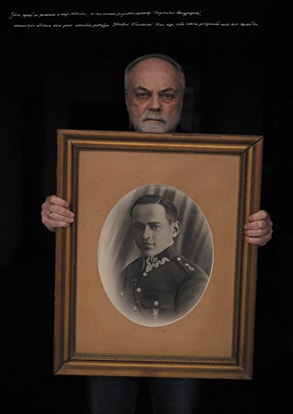
Bartosz Kryński
„Józio zginął na posterunku w maju 1926 roku w imię wierności przysiędze wojskowej i Prezydentowi Rzeczpospolitej, odmawiając złożenia broni przed oddziałem podległym Józefowi Piłsudskiemu. Mimo tego cała rodzina pielęgnowała nadal kult Marszałka.”

Artur Smorga
„Orzeł w koronie lub bez – nie ma znaczenia. Dobrze, jeśli czapka i pasek oznaczają powrót. Źle, jeśli to jedyne, co nam pozostało po ich właścicielu. Historia po raz kolejny stała się przyczyną obecność i nieobecności.”

Ania Wręga
„Nic nie wiem o moich pradziadkach. Nie znam ich nawet z opowieści, moja Babcia nigdy o nich nie mówiła. Nie dlatego, że ich nie pamiętała. Zginęli w czasie II wojny, gdy była jeszcze dziewczynką. Ciężar przeżyć «zasznurował» jej usta.”
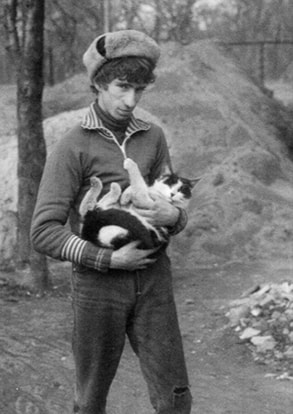
Andrzej Kubanowski
„Niewinność…?? ok. 1986 r.”


Iza Maciusowicz
„Przedstawione fotografie mówią o losach mojej rodziny, na które ogromny wpływ miała II wojna światowa i jej skutki, związane z przesunięciem granic. Dorastałam na tzw. Ziemiach Odzyskanych, które po wojnie na mocy postanowień konferencji pokojowych stały się częścią państwa polskiego.
Ludzie, którzy odtąd zamieszkiwali te tereny, w tym przodkowie moi i mojego męża pochodzili z różnych stron przedwojennej Polski. Wśród nich byli przesiedleńcy z terenów wschodnich, które Polska utraciła na rzecz ZSRR, ludzie powracający z zesłania na Syberię lub wywiezieni na przymusowe roboty do Niemiec. Ich historie i drogi powrotu do Polski były różne. Na nowo musieli «zapuścić» swoje korzenie, stworzyć nowy dom.”
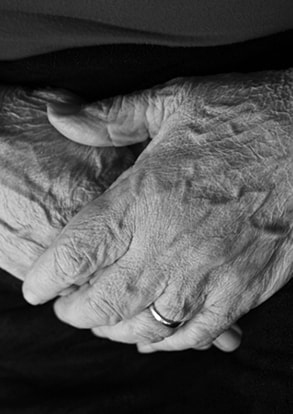
Alicja Ewertowska
„Według dawnej polskiej tradycji kobieta nosząca obrączkę na lewej dłoni straciła męża. Zdjęcie przedstawia dłonie mojej babci Alicji, która w 2003 roku musiała pożegnać dziadka Stasia.”
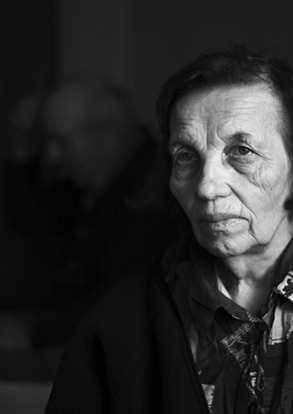
Jagoda Cendrowska
Bez komentarza.
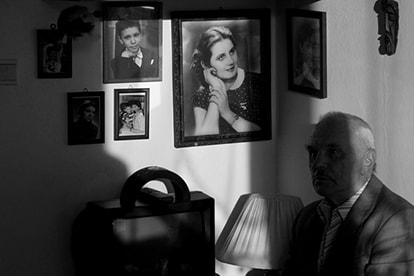
Piotr Zając
„Portret Dziadka, wykonany w jego rodzinnym domu, w którym od kilku lat mieszka sam, po śmierci żony. Na zdjęciu z fotografią Babci zrobioną, kiedy ta miała 17 lat.”
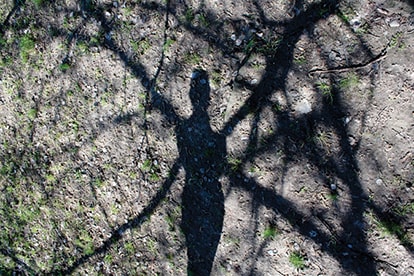
Ewa Iwaniuk
„Zdjęcie przedstawia osobę, która nie jest w stanie uwolnić się z pułapki rodzinnych konfliktów. Konary drzewa, oplatające postać, symbolizują toksyczne relacje między najbliższymi.”
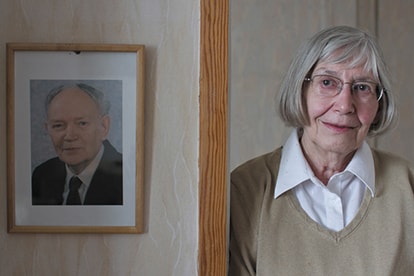
Agnieszka Czyżak
„Dziadek zmarł już prawie dziesięć lat temu, a odczuwamy to tak, jakby to było wczoraj. Babcia wciąż czuje jego obecność, chociaż są rozdzieleni najsilniejszą z granic, granicą między życiem a śmiercią.”
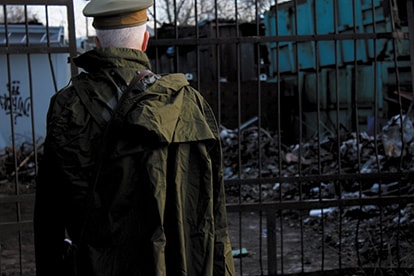
Ania Pełszyńska
„Różnorodność doświadczeń zawsze wpływa na to, kim jesteśmy i kim będziemy. Mój tata – zawodowy żołnierz, z upływem lat przekształcił się w inżyniera, by obecnie stać się menadżerem w dużej firmie telekomunikacyjnej. Pomimo zakończenia służby wojskowej podlegli mu pracownicy to jego «drużyna», a współpraca członków zespołu to podstawa do osiągnięcia sukcesu.”

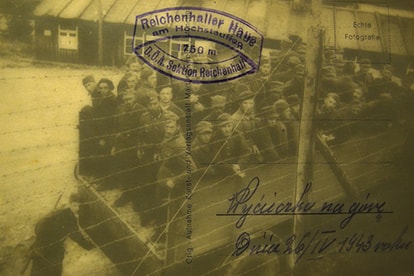
Marta Dębska
„W każdej polskiej rodzinie miała miejsce tragedia związana z II wojną światową. W kwestii interpretacji tematu miałam ułatwione zadanie. Wśród rodzinnych pamiątek zachowało się wiele zdjęć oraz przedmiotów z tamtego okresu. Skupiłam się jedynie na historii mojego pradziadka, który trafił do niemieckiej niewoli walcząc w armii generała Kleeberga. Był w trzech obozach pracy na terenie III Rzeszy i przywiózł ze sobą ogromną ilość pocztówek przedstawiających piękne, alpejskie krajobrazy oraz zdjęcia, które dokumentują życie w obozie pracy.
Zainspirował mnie kontrast między tymi obrazami. Zdecydowałam się podkreślić go poprzez nałożenie na siebie kontrastujących materiałów. W tej serii prac wykorzystałam dodatkowo «nieśmiertelnik» z numerem obozowym pradziadka, jego legitymację, obozowy bon oraz list, który moja rodzina otrzymała, kiedy pradziadek trafił do niewoli.
Drugą częścią mojej realizacji tematu jest kompozycja złożona z fotografii makro. Obiektem jest pas, który mój dziadek zdobył w czasie walk. Należał on do nazistowskiego żołnierza. Nawet najmniejsza plama czy rysa na skórze to część historii. Na klamrze pod nazistowskim orłem znajdowała się swastyka, jednak pradziadek ją zeszlifował. Myślę, że nie byłby w stanie walczyć wiedząc, że nosi na sobie ten znak.”
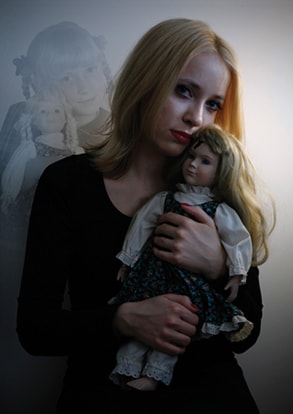
Magda Wlazło
„Lalkę Emilkę dostałam, kiedy miałam 6 lat. Prawie zawsze była przy mnie jako świadek moich radości, smutków i traum. Tych mniejszych i tych większych.”

Rafał Chobot
„Zetknięcie baśniowego, wyimaginowanego świata dziecka z brutalnością i okrucieństwem dorosłych. Niektórych przeżyć nie da się zatrzeć w pamięci, zwłaszcza tych traumatycznych.”
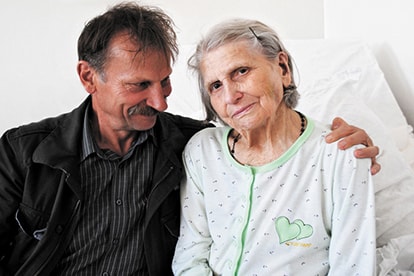
Adrianna Filimoniuk
„Szpital jest miejscem niezarejestrowanych spotkań rodzinnych. Wspomnień po nich nie znajdziemy w żadnym albumie fotograficznym. Choć białe sale wywołują dreszcze, czasem wlewa się w nie nieco ciepła…”
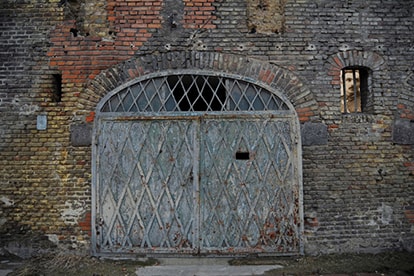
Wojciech Jędrzejewski
„Kilka poniższych zdań to krótka wojenna historia rodzeństwa mojej mamy. Władysława, Bogusława, Antoniego i Marii Malczewskich.
Z najwyższego okna kamienicy spogląda wujek Władek Malczewski, podporucznik Wojska Polskiego. Został zamordowany w Katyniu w 1940 roku przez NKWD. Miał zaledwie 33 lata, był inżynierem. Obok fotografia mojego taty, Zbigniewa Jędrzejewskiego, który w czasie okupacji pracując w gminie w Stopnicy, wypisywał fałszywe Kennkarty dla partyzantów AK. Miał 20 lat, kiedy ryzykował życie. Obok niego jest zdjęcie mojej mamy, Marii Malczewskiej cudem ocalałej w styczniową noc 1940 roku w czasie nalotu niemieckiej żandarmerii na dom w Łubnicach, w którym schronili się partyzanci oddziału AK «Jędrusie». Miała wówczas 16 lat.
W najniższym rzędzie fotografii dwaj bracia mojej Mamy – Antoni i Bogusław Malczewscy, oficerowie Wojska Polskiego, którzy z Armią Andersa trafili po II wojnie światowej do Londynu, gdzie osiedlili się na stałe. Nie zdecydowali się wrócić do komunistycznej Polski. Wujek Tolek przez wiele lat mieszkał w jednym domu z bratem swojej żony, Łotyszem Jurisem Berzinsem, który został przez hitlerowców przymusowo wcielony do wojska. To ten w mundurze Wehrmachtu.”

Aleksandra Przerwa
„W mojej rodzinie przez wiele lat krążyły opowieści na temat ciężkich przeżyć, jakie dotknęły moich przodków – dziadków, pradziadków i ich rodziców. Rodzina mojego taty pochodzi z Wielkopolski – regionu, który znalazł się pod zaborem niemieckim.
Moja praca opiera się na trzech przekazanych mi historiach. W każdej z nich ważny jest podział, oddzielenie od domu albo rodziny. Oddzielenie i tęsknota symbolizowane są w moim kolażu białymi liniami przedzielającymi elementy zdjęć. Praca złożona jest z fotografii, które znalazłam w rodzinnym archiwum. Na pierwszym planie są osoby, dla których dane momenty były najbardziej traumatyczne. W tle znajdują się elementy i osoby, które w danych wydarzeniach uczestniczyły.”
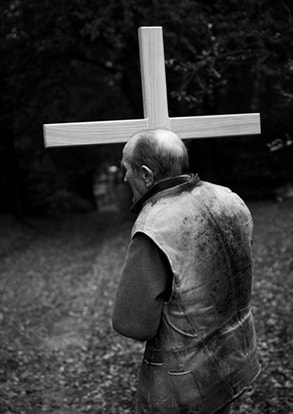
Paweł Wroniszewski
„Żołnierz Armii Krajowej, więzień obozów hitlerowskich, Józef Kazimierz Wroniszewski (13.02.1925 – 30.09.2013). Ojciec, dziadek, pradziadek; historyk, literat, varsavianista.”
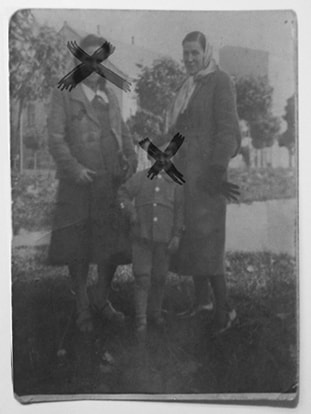
Oliwia Cabaj
Bez komentarza.
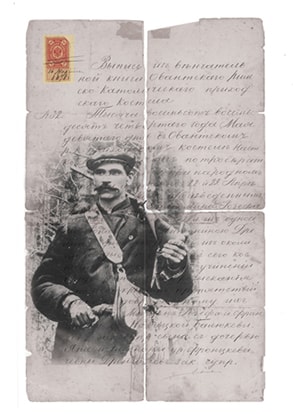
Helena Nowakowska
„Moi pradziadkowie poznali się na Syberii, w Talicy, gdzie pradziadek Józef trafił za walkę w Legionach, zaś prababcia Helena urodziła się tam jako wnuczka polskiego zesłańca po powstaniu styczniowym 1863 roku. Po wielu perypetiach udało im się wrócić do Polski nieogrzewanym pociągiem towarowym. W czasie podróży umarła ich córeczka Wanda. W 1922 roku dojechali do Polski i zamieszkali w Krakowie.”
